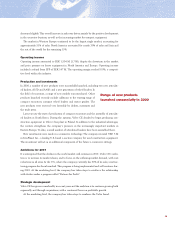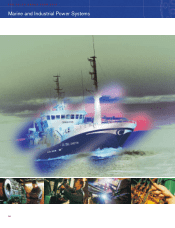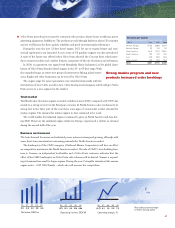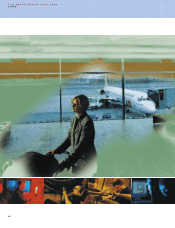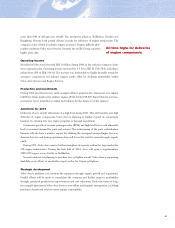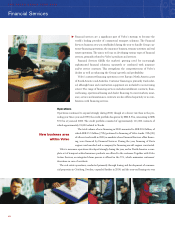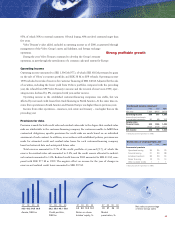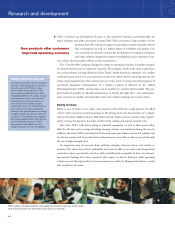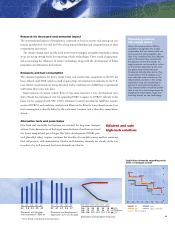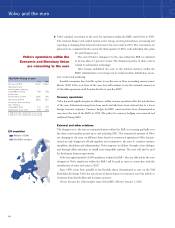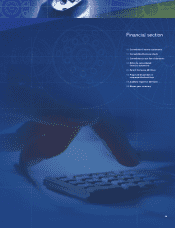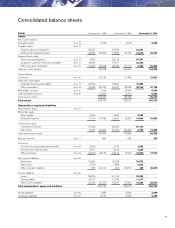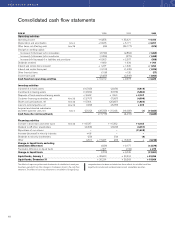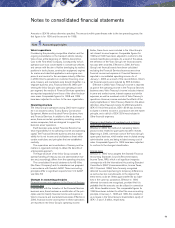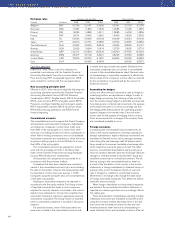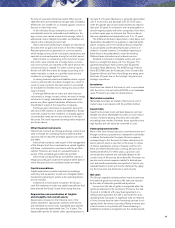Volvo 2000 Annual Report Download - page 47
Download and view the complete annual report
Please find page 47 of the 2000 Volvo annual report below. You can navigate through the pages in the report by either clicking on the pages listed below, or by using the keyword search tool below to find specific information within the annual report.
45
96 97 98 99 00
Research and develop-
ment expenses*, SEK bn
3.4 3.6 4.3 4.5 4.9
96 97 98 99 00
Research and development
expenses* as % of net sales
5.3 4.7 4.7 3.6 3.7
Research for decreased environmental impact
The environmental impact of transports is constantly in focus in society and among our cus-
tomers, and therefore it is vital for Volvo’s long-term profitability and competitiveness to show
commitment and actions.
The climate change issue and the need to meet more stringent air-quality standards in urban
areas, are strong driving forces for improving vehicle technologies. There is still a large poten-
tial in increasing the efficiency of today’s technology, along with the development of future
propulsion and alternative fuel systems.
Emissions and fuel consumption
The emission legislation for heavy trucks, buses and construction equipment in the EU has
been defined until 2008, which in itself requires large development investments. In the U.S.,
even stricter requirements are being discussed. Volvo’s ambition is to fulfill these requirements
well before they come into force.
Improvements of current vehicle fleets in big cities represent a new development area.
Volvo Trucks has introduced a kit for upgrading EURO1 engines to EURO2. Already today,
buses can be equipped with VEC (Volvo Emission Control) and thereby fulfill the require-
ments of EURO4, and oxidation catalysts and filters can be fitted to buses already in use. Low
fuel consumption is directly linked to the customers’ business, and is therefore competition-
driven.
Alternative fuels and powertrains
Non-fossil and renewable fuel systems are essential for long-term transport
systems. Volvo Buses is one of the largest manufacturers of methane-powered
city buses, using natural gas or biogas. The Volvo development of DME-pow-
ered (dimethyl ether) engines, combines the benefits of renewable sources and low emissions.
Fuel cell projects, with demonstrator vehicles and laboratory research, are already under way
in order to be well prepared for future demands on vehicles.
Legislative demands regarding emis-
sions of nitrogen oxides
1995 2000 2005 2010 2015 2020
Estimated road transport emissions
1007652322319
1007247271917
100 108 113 112 112 112
■ NOx
■ PM-diesel
■ CO2
10
8
6
4
2
0
Japan
Japan, not decided
EU
U.S.
96 98 00 02 04 06 08 10
U.S. not decided
Euro 2
Euro 3
Euro 4
Euro 5
USO4
US98
Pioneering research
into energy issues
Volvo’s Environment Prize 2000 is
awarded in recognition of a unique
cooperation that has transcended cul-
tural, economic and geographic bor-
ders. Four scientists from four different
parts of the world have worked with
the question of how the world’s en-
ergy resources can be made to suffice
as the world’s population grows and
the global environment becomes
threatened. Among other points, they
showed that if the developing coun-
tries make the same mistakes as the
industrialized countries in the energy
exploitation area, this would lead to
enormous environmental problems.
They reasoned that it would be prefer-
able to aim for a technological gain by
skipping the intermediate stage and
focusing directly on new technology.
Efficient and safe
high-tech solutions
* Volvo Group excluding divested operations


